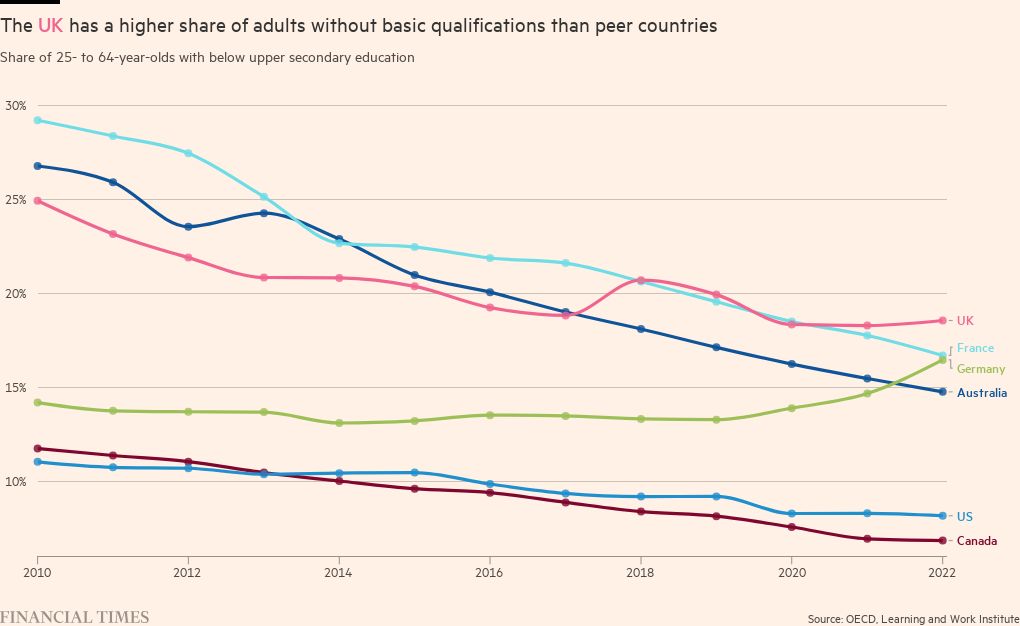
This article is an onsite version of our FirstFT newsletter. Subscribers can sign up to our Asia, Europe/Africa or Americas edition to get the newsletter delivered every weekday morning. Explore all of our newsletters here
Good morning. In big news out of the US, Donald Trump has been found guilty of conspiring to buy the silence of a pornographic actor days before the 2016 election and covering his tracks in business records, becoming the first former US president to be convicted of a crime as he seeks a second term in office.
The unanimous verdict in the Manhattan “hush money” case came at just after 5pm local time yesterday after almost two days of deliberation by the seven men and five women of the jury.
The criminal trial, which Trump was forced to attend in person, was the first of any former US president. The historic conviction is a vindication for Manhattan’s Democratic district attorney Alvin Bragg, who brought the case last year after it had been abandoned by his predecessor.
Over the course of five weeks, jurors had heard from one-time prominent figures in Trump’s orbit, who outlined a “catch and kill” scheme to suppress the story of an alleged extramarital encounter with Stormy Daniels after she threatened to go public with her tale. Read the full report here.
-
New York celebrates: Across the country, Trump’s conviction prompted scenes of agony and ecstasy among fans and foes. In New York, where Trump is deeply unpopular, the reactions tilted more to the latter.
-
Political system on trial: Senior Republicans condemned the trial as a sham, while Democrats were commensurately jubilant. The polarised reactions seal this presidential election’s fate as a contest over the rule of law, writes Edward Luce.
Here’s what I’m keeping tabs on today and this weekend:
-
Economic data: Nationwide has its May house price index for the UK, France reports preliminary first-quarter GDP, Germany reports April retail trade turnover and the EU releases flash inflation figures for May today.
-
Companies: Flutter Entertainment transfers its listing category on the main market of the London Stock Exchange from “premium” to “standard” today in order to relocate its primary listing to New York.
-
Elections: India holds final polls in its multistage parliamentary election on Saturday, while Iceland votes for its next president. Mexico has presidential and legislative elections on Sunday.
How well did you keep up with the news this week? Take our quiz.
Five more top stories
1. Most British voters expect their taxes to go up after the UK general election whichever of the two main parties wins, a new survey shows. Despite efforts by both parties to play down the prospect of rises, 56 per cent of voters said they expected Labour to raise taxes, while 52 per cent said the same of the Conservatives, according to an Ipsos poll conducted for the Financial Times.
2. President Joe Biden has approved Kyiv’s use of US-made weapons to strike within Russia as long as the potential targets relate to Moscow’s offensive in Ukraine’s Kharkiv region, a US official said yesterday. The decision marks an important shift from Washington’s previous position that Ukraine should not use US weapons to strike targets in Russia.
3. Companies are taking advantage of record highs for the FTSE 100 to raise cash at the fastest rate in three years. Even as the number of new listings in London remains subdued, the volume of follow-on transactions — in which investors in listed companies offload significant chunks of their stock — has already reached $11.5bn this year.
4. Fintechs such as Monzo, Starling and Revolut are being tested in a downturn as the venture capital that financed their heady growth dries up. The start-ups that sought to usurp “legacy” banks are still burning through cash to acquire new customers while higher interest rates are driving increased competition for consumer deposits, leading investors to scrutinise their differing business models and assets.
5. A Saudi Arabian fund has backed China’s most prominent generative artificial intelligence start-up. Prosperity7, part of the oil group Aramco’s venture capital arm, has participated in a roughly $400mn investment round in start-up Zhipu AI, becoming the only foreign investor in China’s efforts to create a homegrown rival to OpenAI.
News in-depth

Melbourne-based miner BHP sweetened its all-share takeover bid for Anglo American twice, but in the end its chief executive Mike Henry had to admit defeat. The £39bn deal would have handed his company Anglo’s coveted copper assets and positioned the group as a major winner from the global shift to green energy. An agreement ultimately proved elusive, as the polite language of official statements belied the increasing rancour of the six-week-long takeover battle.
We’re also reading . . .
-
EU elections: Rightwing parties are set to win more seats and influence than ever before in next week’s European polls, writes Ivan Krastev, making the next parliament more polarised and fragmented.
-
South Africa: After 30 years in which the African National Congress has been the undisputed party of government, the country now looks set to enter a period of turbulent coalition politics, writes David Pilling.
-
EU energy: The European gas market has proved far more resilient since the invasion of Ukraine than many would have guessed, writes Natasha Fielding at Argus Media, but maintaining the single gas market is likely to cost a lot more in the future.
Chart of the day
A new report from the Learning and Work Institute, a think-tank, reveals the UK’s poor record on skills training. Almost a fifth of working-age adults do not have basic qualifications, more than twice the share in the US and Canada. The UK has not kept pace with peer countries, falling behind France and Australia in recent years.

Take a break from the news
For the past 10 years, every spring, Sam Lee has taken up residence in the woods in Sussex to sing with the nightingales. The age-old question of whether man and animal can communicate has returned again in the age of machine learning, writes Joy Lo Dico, as computers set about trying to interpret animal sounds.

Additional contributions from Benjamin Wilhelm
Recommended newsletters for you
One Must-Read — Remarkable journalism you won’t want to miss. Sign up here
Sort Your Financial Life Out — Learn how to make smarter money decisions and supercharge your personal finances with Claer Barrett. Sign up here